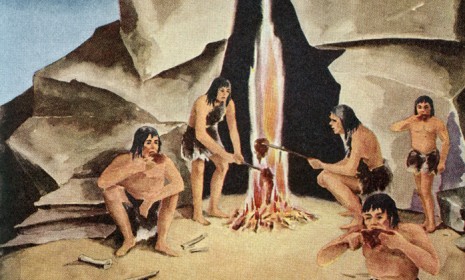Eating like a caveman: A passing fad or the diet of the future?
The Paleo diet, which encourages practitioners to eat meat and veggies while skipping grains and dairy, is gaining more followers, but it may not be healthy

A free daily email with the biggest news stories of the day – and the best features from TheWeek.com
You are now subscribed
Your newsletter sign-up was successful
Everyone wants to lose weight and feel healthy. The secret, according to practitioners of the "Paleo diet," is to eat the same foods our hunter-gatherer ancestors ate. The movement is gaining momentum thanks to dedicated fans who swear by the diet's steady intake of meat and veggies. Skeptics are wary, though, and research supporting so-called "evolutionary eating" is thin at best. Here, a brief guide to the caveman regimen:
What do people eat on the Paleo diet?
Mostly meat, but also vegetables, fruits, nuts, and seeds. Fatty cuts of red meat are encouraged, while foods like sugar, dairy, grains, and beans are all off-limits. Paleo acolytes term these "neolithic staples," or foods that began appearing when agriculture took off 10,000 years ago. "You can forget about that bowl of Total cereal with cold milk," says Barb Berggoetz at Indystar. "Don't think about crunching on Triscuits either." A typical Paleo meal includes grilled steak on a bed of uncooked spinach, for example, with a few blueberries for dessert.
The Week
Escape your echo chamber. Get the facts behind the news, plus analysis from multiple perspectives.

Sign up for The Week's Free Newsletters
From our morning news briefing to a weekly Good News Newsletter, get the best of The Week delivered directly to your inbox.
From our morning news briefing to a weekly Good News Newsletter, get the best of The Week delivered directly to your inbox.
Why are those foods supposedly better?
Long before the advent of farming, the human body evolved to subsist mainly on foods that early man had to either hunt or forage for. When agriculture refined our habits and made dining easier, humans became noticeably "fatter, less muscular, and more prone to disease," says George Dvorsky at io9. Practitioners of the Paleo diet think the main culprit behind many of our health woes is a protein called gluten, which "may, in fact, be a poison." The thinking goes that some plants — like whole grains — developed chemical resistances to keep animals from eating them. Paleo dieters are supposed to stay away from gluten entirely.
Who thought of this?
The grandfather of the movement is widely considered to be a man named Art De Vany, who is now in his 70s and adopted the caveman diet some 30 years ago to improve his family's health. Robb Wolf — a biochemist whose book The Paleo Solution is considered required reading by followers — is credited with popularizing the movement's recent ascent. "I ate a vegan diet for two years and I got down to 135 pounds and couldn't lift my own body weight on the bench press," Wolf told ABC News. He credits the Paleo diet, particularly meat, for giving him his strength back.
A free daily email with the biggest news stories of the day – and the best features from TheWeek.com
Does research back these claims?
Studies looking at Paleo's effects are few and far between. One early clinical trial, however, is showing "promising results," says Eliza Barclay at NPR. Anecdotes of people losing weight, getting in shape, and facing fewer health problems overall are sprinkled on blogs all across the internet. But the results likely aren't from diet alone: People on the Paleo diet often engage in CrossFit, an intensive workout program that encourages ultra-quick weightlifting.
But is Paleo really healthy?
The Paleo diet placed dead last among 25 evaluated for U.S. News & World Report magazine, and the high levels of fat are often worrisome to experts. Some scientists think people on the diet could be losing weight simply because they're exercising more and are eating less sugar and drinking less alcohol (another big no-no).
-
 How the FCC’s ‘equal time’ rule works
How the FCC’s ‘equal time’ rule worksIn the Spotlight The law is at the heart of the Colbert-CBS conflict
-
 What is the endgame in the DHS shutdown?
What is the endgame in the DHS shutdown?Today’s Big Question Democrats want to rein in ICE’s immigration crackdown
-
 ‘Poor time management isn’t just an inconvenience’
‘Poor time management isn’t just an inconvenience’Instant Opinion Opinion, comment and editorials of the day